

Taxing Lessons Newsletter - April 30, 2011. These are archived issues of Taxing Lessons, the newsletter that condenses selected US Tax Court opinions into interesting, informative summaries--and lets you be the judge.
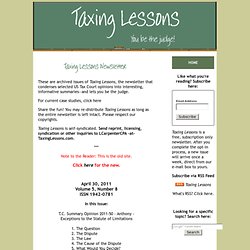
For current case studies, click here Share the fun! You may re-distribute Taxing Lessons as long as the entire newsletter is left intact. Please respect our copyrights. Taxing Lessons is self-syndicated. Note to the Reader: This is the old site. Click here for the new. April 30, 2011 Volume 5, Number 8 ISSN 1942-0781 Note: Taxing Lessons provides a summarized version of sometimes lengthy court decisions. Can the IRS ask for additional tax after the statute of limitations expires? From Internal Revenue Code Section 1311: Correction of error. From Internal Revenue Code Section 6501: Provides the period of limitations for assessing all taxes assessed under the code. From Fong v. From Estate of SoRelle v.
Exceptions to this general rule apply in some situations, such as when certain errors are made. M & A Law Prof Blog. Vice Chancellor Laster handed down a decision in Rural Metro Corporation Stockholders Litigation (opinion here) on Friday evening.
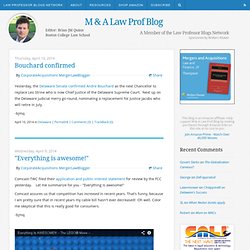
It's Del Monte-like, in that it's the kind of opinion that's going to generate a lot of ink and opinions. If it wasn't already clear to investment banks, it should be now. The Delaware courts are going to look very closely at transactions where there may be banker conflicts brought about by the prospect of staple financing. In this particular case, RBC was brought in to advise the Special Committee of Rural Metro on strategic alternatives. The Legal Whiteboard. Last fall, while making a presentation at the Midwest Association of Pre-Law Advisors Conference in St.
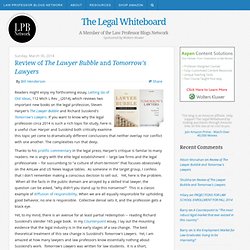
Louis, I had the opportunity to respond to the question that is the title of this blog posting. Is the employment market for law graduates going to be improving? My answer was, and is, almost certainly yes, although perhaps not immediately. I write this to offer my perspective on the employment market for law graduates in the coming years. A number of people have written on this topic in recent weeks and months. To avoid some of these definitional challenges, this post will focus solely on the market for full-time, long-term Bar Passage Required jobs. Class of 2013 – Little if Any Good News is Likely. Legal Writing Prof Blog.
Thursday, April 17, 2014 Shall we eliminate "shall"?
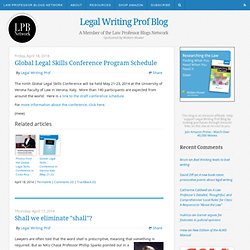
Lawyers are often told that the word shall is prescriptive, meaning that something is required. But as NKU Chase Professor Phillip Sparks pointed out in a recent Kentucky Bench and Bar column, shall can actually have several meanings and may be more confusing than helpful. Sparkes points out that England, Scotland, Australia, and New Zealand have largely eliminated shall from legal writing. Romney's CRUT Tax Shelter. The Bloomberg press has looked further at Romney's use of trusts and other arrangements to avoid taxes, using Freedom of INformation Act requests to obtain more information than was released by Romney in his meager tax return release. Romney established a charitable trust in 1996 of a type that Congress cracked down on in 1997 (regrettably, a crackdown that grandfathered existing arrangements, which is the way so many rich people get to keep using abusive shelters).
See Jesse Drucker, Romney Avoids Taxeds via Loophole Cutting Mormon Donations, Bloomberg.com (Oct. 29, 2012). So what did Romney do. He used a "charitable remainder unitrust" (CRUT) in a way that alllowed him to use the tax-exempt status of the Mormon Church (his primary charitable beneficiary) to defer taxes for more than 15 years. “The main benefit from a charitable remainder trust is the renting from your favorite charity of its exemption from taxation,” [Jonathan] Blattmachr [, a trusts and estates lawyer] said. Tax Controversy Update. The Becker-Posner Blog. Blog Index « Roth & Company, P.C. Not a firm foundation.
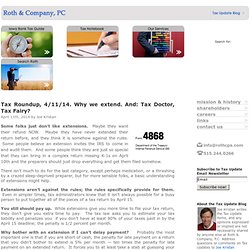
A U.S. District Court case out of Texas last week shows why using a tax-exempt entity can be hazardous to your health. A Mr. Ziegenhals was “manager, director, trustee, and registered agent” of The Le Tulle Foundation, which was “formed in 1991 as a testamentary trust with the stated purpose of operating ‘exclusively for charitable purposes for the benefit of the citizens of Matagorda County, Texas [and] for no other purposes.’” The court said an IRS audit found that Mr. What did that cost the alleged self-dealer? The amount allegedly owed by Ziegenhals – $461,125.44 as of November 29, 2013 — is based on the IRS’s calculations of penalties, statutory additions, and interest that have accrued from his unpaid private foundation excise taxes in 2003 and his unpaid federal income taxes in 2007.
I don’t recommend private foundations for taxpayers who lack a huge amount of money. Cite: Zeigenhals (USDC SD-TX, 3:11-cv-00464) A Lawyer's Guide to Writing Marie Buckley: legal writing coach/ legal writing training: Home page. Fifth Circuit Blog. Federal Tax Procedure. Circuit Splits. Federal Tax Crimes. SCOTUSblog. TaxProf Blog. Balkinization.